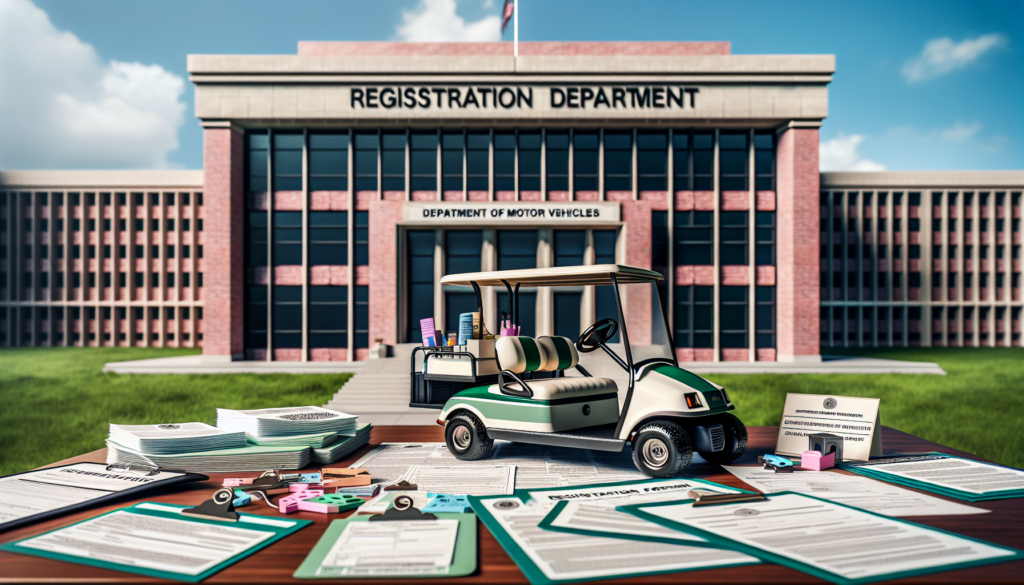Navigating the complexities of golf cart registration and the related paperwork can be daunting for first-time buyers. This thorough guide simplifies this often confusing process by providing clear instructions and answering frequently asked questions. From understanding where and how to register your golf cart, to knowing what paperwork you need to have on hand, this guide is a must-have resource to streamline your journey to owning a golf cart. Let’s take a tour through the labyrinth of golf cart registration together, and make sure you’re equipped with everything you need to hit the fairway in no time.

Understanding Golf Cart Registration
Just like any other type of vehicle, golf carts, especially those that are used on public roads, also need to be properly registered. Registering a golf cart not only makes it legal for on-road use, but it also provides the owner with necessary protections in case of accidents, theft, or any disputes related to the vehicle’s use and ownership.
Differences between Golf Carts, LSVs, and ATVs
For many, the terms golf cart, LSV (Low-Speed Vehicle), and ATV (All-Terrain Vehicle) might be used interchangeably. However, these three categories of vehicles differ markedly in their purpose, usage, and often, in the regulations governing them. Golf carts, as the name implies, are primarily meant for use in golf courses. LSVs, on the other hand, are designed to travel at lower speeds and are often used in small community settings. ATVs usually refer to off-road vehicles and are generally not street legal. Understanding these differences is important because different types of vehicles might need different types of registration and licensing.
Is Registration Necessary for All Golf Carts?
Generally, if a golf cart is used exclusively within private properties, like golf courses or private estates, then registration might not be necessary. However, if the golf cart is to be used on public roads or across neighborhoods, then it would likely need to be registered, similar to any other motor vehicle.
State-Specific Golf Cart Regulations and Requirements
Gold cart registration regulations and requirements can largely vary from state to state as transportation laws are usually under the jurisdiction of each individual state. Some states might have very lax regulations, while others might have very specific and stringent requirements. It’s crucial to do your due diligence and familiarize yourself with the unique regulations of your specific state.
Starting the Registration Process
Once you’ve determined that your golf cart needs to be registered, you’re now ready to start the registration process.
Where to Begin: Department of Motor Vehicles (DMV) or Equivalent
Your local Department of Motor Vehicles (DMV) or its equivalent is your starting point for golf cart registration. The DMV is the government agency responsible for handling vehicle registrations and maintaining vehicle records. Make sure to check the business hours and the services offered by your local DMV branch before planning your visit.
Online Registration Options
Many DMVs nowadays also offer online registration options. This can be a faster, more convenient alternative to visiting a DMV branch. However, not all states offer this service, so make sure to verify this with your local DMV.
Pre-registration Checklist for Golf Cart Owners
Before proceeding with registration, it helps to prepare a pre-registration checklist. This list will typically include the necessary documentation for verification, the registration fees to be paid, and other specific requirements imposed by your state.
Basic Documentation Required
To register a golf cart, you’ll typically need to provide several basic documents for verification.
Proof of Ownership: Title and Bill of Sale
These documents serve as proof that you legally own the golf cart. The title is a legal document that establishes the ownership of a vehicle, while the bill of sale is a record of the transaction between the buyer and the seller.
Manufacturer’s Certificate of Origin (MCO)
The MCO is a document provided by the manufacturer that certifies that the golf cart is free of liens and encumbrances. This document is usually given when a golf cart is bought brand new.
Valid Identification of the Owner
You should also bring a valid ID that can confirm your identity and address. This is a necessary step to ensure the security and accuracy of the registration process.
Additional Paperwork for Golf Cart Registration
In addition to the basic documents, there might be other paperwork involved depending on your state’s regulations.
Application for Registration Forms
An application form must be filled out and submitted. This form typically includes details about the vehicle and the owner, similar to when registering a traditional motor vehicle.
Sales Tax and Ownership Transfer Forms
In most states, you will need to pay sales tax on the purchase of a golf cart. You’ll need to submit a form for this. If the golf cart was previously owned by somebody else, a transfer of ownership form might also be required.
Proof of Insurance, if Applicable
If your state requires golf carts to be insured, then proof of insurance will also be necessary. This proof typically comes in the form of an insurance certificate or a card issued by your insurance provider.

Customizing and Modifying Golf Carts
Customizing and modifying golf carts can add personal style and improved functionality. However, certain rules and disclosures need to be followed when registering a customized golf cart.
Legal Modifications versus Illegal Alterations
Some modifications, like adding safety equipment or improving accessibility, are typically allowed and even encouraged. Meanwhile, modifications that can potentially impair the safety and roadworthiness of the golf cart, are usually illegal.
Documentation for Custom Parts and Modifications
When registering a customized golf cart, it’s important to provide documentation for all the parts and modifications made on the vehicle. This documentation serves as a record of the changes made to the golf cart and can be helpful in case of recalls or warranty claims.
Impact of Modifications on Registration and Insurance
Modifications can impact your golf cart’s registration and insurance. They might affect the classification of the golf cart, its value, and its risk profile, which can, in turn, affect the cost and terms of its insurance.
Inspection and Safety Standards
Before a golf cart can be registered, it usually has to pass an inspection to ensure it meets safety standards.
When is a Vehicle Inspection Required?
Golf carts that are going to be used on public roads regularly will typically need to undergo a vehicle inspection. States have different criteria for what constitutes a ‘street legal’ golf cart, so be sure to verify what the requirements are in your area.
Meeting Street-Legal Safety Requirements
Street-legal safety requirements for golf carts typically include the installation of proper lighting, braking systems, seatbelts, and other safety equipment. Golf carts should also not exceed specific speed limits.
Submitting Inspection Certification
Once your golf cart has passed the inspection, you’ll usually need to submit the inspection certification as part of the registration process.
Fees and Charges
Registering a golf cart comes with certain costs.
Registration Fees and Taxes
DMVs usually charge a registration fee. The amount can vary depending on the state. Some states might also impose specific taxes on golf cart ownership and use.
Potential Penalties for Late Registration
Some states might impose late registration penalties. So, make sure to complete your golf cart’s registration on time.
Renewal Fees and Grace Periods
Vehicle registrations usually need to be renewed periodically. The DMV will typically charge a renewal fee. There might also be a grace period, during which the registration can still be renewed without incurring any penalties.
Insurance Requirements for Golf Carts
Many states require golf carts to have insurance, particularly if they are to be driven on public roads.
Determining if Insurance is Necessary
The necessity for insurance depends largely on where and how the golf cart is used, as well as your state’s particular laws. If your golf cart is used only within private properties, insurance might not be necessary. However, if your golf cart is to be used on public roads, then insurance would likely be a requirement.
Types of Insurance Policies for Golf Carts
Know that there are different types of insurance policies available for golf carts. Liability insurance covers damages you might cause to others, collision insurance covers damages to your own golf cart in a crash, and comprehensive coverage insures against theft or damages from causes other than a collision.
Providing Proof of Insurance to the DMV
Insurance providers typically issue an insurance certificate or card as proof of insurance. This proof needs to be provided to the DMV when registering a golf cart.
Special Circumstances
Special circumstances might require different registration and ownership procedures.
Registering a Golf Cart for Commercial Use
Golf carts used for commercial purposes might need to be registered differently and might also require special licensing and insurance coverage.
Imported and Vintage Golf Carts
Imported golf carts might need special certifications or modifications before they can be registered. Vintage golf carts might also require unique registration procedures and possibly, specific licensing.
Golf Carts and Homeowners Associations (HOAs)
If you live in a community governed by a Homeowners Association (HOA), your golf cart use and registration might be subject to the rules of your HOA. Check if there are any specific rules or regulations that you need to follow.
FAQs: Common Questions Answered
Even after going through all the information above, there might be a few more questions you still have about golf cart registration.
The Difference Between Registering a New Vs. Used Golf Cart
Registering a new golf cart typically involves providing the MCO and paying the sales tax on the purchase price. Meanwhile, registering a used golf cart usually involves transferring the title and possibly paying sales tax on the sales price.
How to Handle Out-of-State Golf Cart Purchases
Out-of-state purchases might require additional paperwork to transfer the title and registration. The golf cart might also need to meet your state’s safety standards, which may differ from those of the state where the golf cart was originally registered.
Updating Registration after Modifying the Golf Cart
If you modify your golf cart after registering it, you might need to update your registration and possibly, your insurance policy. The DMV requires accurate, up-to-date records of vehicle modifications to ensure the vehicle remains in compliance with safety standards.
And there you go, that’s what you need to know about registering a golf cart. Remember, rules and regulations vary by state, so always check with your local DMV to understand the specifics in your area.




